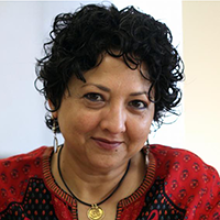
Raka Ray
Raka Ray is Professor of Sociology and South and Southeast Asia Studies, and the present Chair of the Department of Sociology at the University of California, Berkeley. She received her AB from Bryn Mawr College, and her PhD from the University of Wisconsin, Madison.
Professor Ray’s areas of specialization are gender and feminist theory, domination and inequality, the emerging middle classes, and social movements. Publications include Fields of Protest: Women’s Movements in India (University of Minnesota, 1999; and in India, Kali for Women, 2000), Social Movements in India: Poverty, Power, and Politics, co-edited with Mary Katzenstein (Rowman and Littlefeld, 2005), Cultures of Servitude: Modernity, Domesticity and Class in India, co-authored with Seemin Qayum (Stanford University Press, 2009), Elite and Everyman: The Cultural Politics of the Indian Middle Classes, co-edited with Amita Baviskar (Routledge 2011) and Handbook on Gender (Oxford University Press, India, 2012).
Representative Publications:
Books
- Ray, Raka. 2012. (ed.) Handbook of Gender. Delhi: Oxford University Press.
- Baviskar, Amita and Ray, Raka. 2011. (eds.) Elite and Everyman: The Cultural Politics of the Indian Middle Classes. Routledge
- Ray, Raka and Qayum, Seemin. 2009. Cultures of Servitude: Modernity, Domesticity and Class in India. Palo Alto: Stanford University Press (in India, Oxford University Press, 2010)
- Ray, Raka and Katzenstein, Mary and. 2005. (eds.) Social Movements in India: Poverty, Power, and Politics. Rowman and Littlefeld (Published in India by Oxford University Press)
- Ray, Raka. 1999. Fields of Protest: Women’s Movements in India. Minneapolis: University of Minnesota Press.
Published in India by Kali for Women, 2000
excerpted in Louise Edwards and Mina Roces (eds) Women in Asia, Vol. 1: Women and Political Power. London and New York: Routledge, 2009)
Articles
- Ray, Raka. 2012. “The Everyday Embrace of Inequality” The Hindu, Feb 2.
- Ray, Raka. 2011. “The Politics of Knowledge: The Women’s Movement and Gender Scholarship in India” in Raka Ray (ed.) Handbook on Gender (Oxford University Press, India)
- Baviskar, Amita and Ray, Raka. 2011. “Introduction” in Amita Baviskar and Raka Ray (eds) Elite and Everyman: The Cultural Politics of the Indian Middle Classes. Routledge,
- Qayum, Seemin Qayum and Ray, Raka. 2011. “The Middle Classes at Home” in Amita Baviskar and Raka Ray (eds) Both Elite and Everyman: The Cultural Politics of the Indian Middle Classes (Routledge)
- Ray, Raka. 2011. “The Middle Class”: Sociological Category or Proper Noun?” Political Power and Social Theory 21
- Qayum, Seemin and Ray, Raka, 2010. “Male Servants and the Failure of Patriarchy in Kolkata (Calcutta)” Men and Masculinities October 2010 13: 111-125
- Qayum, Seemin and Ray, Raka, 2010. “Traveling Cultures of Servitude: Loyalty and Betrayal in New York and Kolkata” in Eleen Boris and Rhacel Parrenas (eds) Intimate Labors: Care, Domestic and Sex Work (Stanford University Press.)
- Ray, Raka and Radhakrishnan, Smitha. 2010. “The Subaltern, the Postcolonial, and Cultural Sociology” in John Hall, Laura Grindstaff, and Ming-Cheng Lo (eds.) Handbook of Cultural Sociology (Routledge, 2010)
- Ray, Raka. 2006 “Is the Revolution Missing or Are We Looking in the Wrong Places?” Social Problems, November.
- Ray, Raka. 2006. “A Slap from the Hindu Nation” in Amrita Basu and Srirupa Roy (eds) Violence, Modernity and Democracy in India, Berg Press (Calcutta: Seagull India Press).
- Ray, Raka and Katzenstein, Mary. 2005. “And in the Beginning there was the Nehruvian State” in
- Raka Ray and Mary Katzenstein (eds.), Social Movements in India: Poverty, Power, and Politics. Rowman and Littlefeld.
- Ray, Raka. 2004. “Feminist Theory: Two Decades After the Missing Revolution” in Perspectives 27(3)
- Qayum Seemin and Ray, Raka. 2003. “Grappling with Modernity: Calcutta’s Respectable Classes and the Culture of Domestic Servitude” Ethnography 4:4 (reprinted in Open Times 1: 2004, Beijing, China)
- Ray, Raka. 2003. “On Engendering A Better Life” John Foran, Kumkum Bhavnani and Priya Kurien (eds) Feminist Futures: Re-Imagining Women, Culture and Development. Zed Press
- Ray, Raka. 2002. “Where Women Bore the Brunt” The Hindu, May 11.
- Ray, Raka. 2001. “The Burden of History: Women’s Movements in the Third World” for "Geschlechterverhaeltnisse und soziale Bewegungen" (Gender and Social Movements) of the Forschungsjournal Neue Soziale Bewegungen 2, June.
- Ray, Raka. 2000. “Masculinity, Femininity And Servitude: Domestic Workers in Calcutta in the Late Twentieth Century” Feminist Studies 26(3)
- Ray, Raka. 1999. “Women’s Movements in the Third World: Identity, Mobilization and Autonomy” with Anna C. Korteweg, for Annual Review of Sociology 25:47-71.
- Ray, Raka. 1998. “Women’s Movements and Political Fields: A Comparison of Two Indian Cities” Social Problems 45 (1).
- Ray, Raka. 1998. “Revisiting the Indian Sociology Debates: A Sociology for India versus a Sociology of India” Center for South Asian Studies Working Papers Series.
- Ray, Raka 1995. “Conformity and Rebellion: Girls' Schools in Calcutta” in Bharati Ray (ed.) From the Seams of History: Essays on Indian Women. New Delhi: Oxford University Press.
- Ray, Raka. 1988. “The Contested Terrain of Reproduction: Class, Gender and Schooling in India” British Journal of Sociology of Education 9 (4).
